I think that threads are irrelevant to understanding the use of reference counters. The point is rather ownership and lifetime, and a thread is just one thing that is affected by this. This is a bit difficult to explain, hopefully I'll make this clearer using examples.
Now, let's look at the given example where main() creates an object and starts two threads using that object. The question is, who owns the created object? The simple answer is that main() and both threads share this object, so this is shared ownership. In order to model this, you should increment the refcounter before each call to pthread_create(). If the call fails, you must decrement it again, otherwise it is the responsibility of the started thread to do that when it is done with the object. Then, when main() terminates, it should also release ownership, i.e. decrement the refcounter. The general rule is that when adding an owner, increment the refcounter. When an owner is done with the object, it decrements the refcounter and the last one destroys the object with that.
Now, why does the the code not do this? Firstly, you can get away with adding the first thread as owner and then passing main()'s ownership to the second thread. This will save one increment/decrement operation. This still isn't what's happening though. Instead, no reference counting is done at all, and the simple reason is that it isn't used. The point of refcounting is to coordinate the lifetime of a dynamically allocated object between different owners that are peers. Here though, the object is created and owned by main(), the two threads are not peers but rather slaves of main. Since main() is the master that controls start/stop of the threads, it doesn't have to coordinate the lifetime of the object with them.
Lastly, though that might be due to the example-ness of your code, I think that main simply leaks the reference, relying on the OS to clean up. While this isn't beautiful, it doesn't hurt. In general, you can allocate objects once and then use them forever without any refcounting in some cases. An example for this is the main window of an application, which you only need once and for the whole runtime. You shouldn't repeatedly allocate such objects though, because then you have a significant memory leak that will increase over time. Both cases will be caught by tools like valgrind though.
Concerning your second question, concerning the heap variable name clash you expect, it doesn't exist. Variable names that are function-local can not collide. This is not because they are used by different threads, but even if the same function is called twice by the same thread (think recursion!) the local variables in each call to the function are distinct. Also, variable names are for the human reader. The compiler completely eradicates these.
